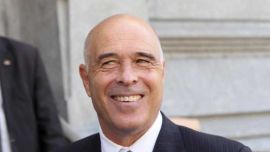The race to succeed Horacio Rodríguez Larreta as mayor of Buenos Aires City kicks off in earnest this Sunday (August 13) as voters in the nation’s capital head to the polls.
Twelve mayoral hopefuls are competing for the votes of more than 2.5 million people who are eligible to vote in the local primaries. They will also be casting ballots in the national presidential primaries and therefore – in a move that may confuse some voters – both paper and electronic ballots will be used, an unprecedented stop.
The PASO primaries in Buenos Aires city will take place at 7,326 polling booths at 1,099 voting centres. As well as the mayoral candidates for the election in October, voters will also be renewing 30 seats at the local legislature.
According to official government data, 2,533,092 residents may vote on Sunday, of which 1,214,871 are men, 1,318,002 are women and 219 are non-binary persons.
Mayoral candidates
Voters can choose from 12 candidates in total but the next mayor is likely to come from one of three names put up by the two main coalitions: Unión por la Patria (UxP), whose mayoral hopeful is Leandro Santoro; and Juntos por el Cambio (JxC), which has two tickets: the Evolución list headed by UCR Senator Martín Lousteau and the Vayamos por Más slate topped by PRO fixture Jorge Macri.
Outsider hopefuls include Ramiro Marra, from the libertarian La Libertad Avanza front, and two left-wing hopefuls for the Frente de Izquierda de Trabajadores-Unidad – Jorge Adaro (Unir y Fortalecer la Izquierda) and Vanina Biasi (Unidad de Luchadores y la Izquierda).
Other options will be Alejandro Nizzero, from Frente Patriota Federal; Adolfo Buzzo Pipet, from Movimiento Libres del Sur; Juan Pablo Chiesa, from Actitud Renovadora; Héctor Heberling, from La Izquierda de la Ciudad (Nuevo Más); Valentina Viglieca, from Política Obrera, and Eduardo Graham, from Principios y Valores.
El Movimiento la Ciudad Somos Quien La Habitamos, from Unidad Popular, will opt for a “short ballot” – that is, no mayoral hopeful but with candidates for deputies for the City Legislature and councillor seats.
The alternatives for the deputy mayor post, according to the City of Buenos Aires Electoral Code, will only be made official 48 hours after the PASO primaries close.
Looking at the race for seats in the City Legislature, there will be 13 alliances vying for the 30 seats to be renewed on December 10, out of a total 60 seats.
How to vote
Voting in this year’s primaries will be complicated in the City with voters being asked to cast paper and electronic ballots.
City Mayor Horacio Rodríguez Larreta chose to have three major electoral events – the PASO primaries, the general election and the potential run-off – held on the same dates as the national dates, albeit under a different system, the Single Electronic Ballot.
The circuit to be followed by every voter is already raising concern as to possible delays, starting with identity validation by polling station authorities.
Those casting ballots will initially opt for traditional paper ballot voting for the national posts of president, vice-president, national deputies and Parlasur (Mercosur Parliament) representatives.
After slipping their envelope containing their choices into one of the ballot boxes at a polling station, the second step will be the use of the electronic device with a touchscreen to select local categories only.
– TIMES/TÉLAM




















Comments